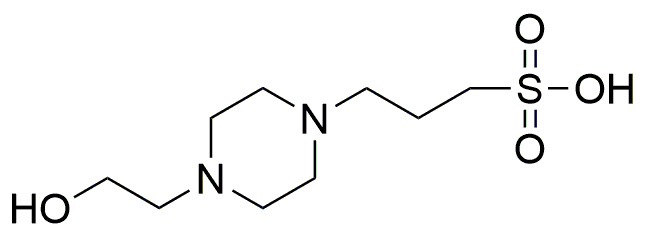EPPS is widely utilized in research focused on
- Biological Buffers: EPPS serves as an effective buffering agent in biological and biochemical applications, maintaining pH stability in various experiments, particularly in cell culture and enzyme assays.
- Protein Studies: Its ability to stabilize proteins makes EPPS a popular choice in protein purification and characterization, helping researchers achieve more accurate results in studies involving protein interactions.
- Pharmaceutical Development: In drug formulation, EPPS is used to enhance the solubility and stability of active pharmaceutical ingredients, which is crucial for developing effective medications.
- Diagnostic Applications: EPPS is utilized in diagnostic kits and assays, particularly in immunoassays, where maintaining optimal pH is essential for accurate detection and quantification of biomarkers.
- Environmental Testing: The compound is also applied in environmental science for analyzing water quality, where it helps in maintaining the necessary pH levels during various analytical procedures.
General Information
Properties
Safety and Regulations
Applications
EPPS is widely utilized in research focused on
- Biological Buffers: EPPS serves as an effective buffering agent in biological and biochemical applications, maintaining pH stability in various experiments, particularly in cell culture and enzyme assays.
- Protein Studies: Its ability to stabilize proteins makes EPPS a popular choice in protein purification and characterization, helping researchers achieve more accurate results in studies involving protein interactions.
- Pharmaceutical Development: In drug formulation, EPPS is used to enhance the solubility and stability of active pharmaceutical ingredients, which is crucial for developing effective medications.
- Diagnostic Applications: EPPS is utilized in diagnostic kits and assays, particularly in immunoassays, where maintaining optimal pH is essential for accurate detection and quantification of biomarkers.
- Environmental Testing: The compound is also applied in environmental science for analyzing water quality, where it helps in maintaining the necessary pH levels during various analytical procedures.
Documents
Safety Data Sheets (SDS)
The SDS provides comprehensive safety information on handling, storage, and disposal of the product.
Product Specification (PS)
The PS provides a comprehensive breakdown of the product’s properties, including chemical composition, physical state, purity, and storage requirements. It also details acceptable quality ranges and the product's intended applications.
Certificates of Analysis (COA)
Search for Certificates of Analysis (COA) by entering the products Lot Number. Lot and Batch Numbers can be found on a product’s label following the words ‘Lot’ or ‘Batch’.
Numéro de catalogue
Numéro de lot/série
Certificates Of Origin (COO)
This COO confirms the country where the product was manufactured, and also details the materials and components used in it and whether it is derived from natural, synthetic, or other specific sources. This certificate may be required for customs, trade, and regulatory compliance.
Numéro de catalogue
Numéro de lot/série
Safety Data Sheets (SDS)
The SDS provides comprehensive safety information on handling, storage, and disposal of the product.
DownloadProduct Specification (PS)
The PS provides a comprehensive breakdown of the product’s properties, including chemical composition, physical state, purity, and storage requirements. It also details acceptable quality ranges and the product's intended applications.
DownloadCertificates of Analysis (COA)
Search for Certificates of Analysis (COA) by entering the products Lot Number. Lot and Batch Numbers can be found on a product’s label following the words ‘Lot’ or ‘Batch’.
Numéro de catalogue
Numéro de lot/série
Certificates Of Origin (COO)
This COO confirms the country where the product was manufactured, and also details the materials and components used in it and whether it is derived from natural, synthetic, or other specific sources. This certificate may be required for customs, trade, and regulatory compliance.

